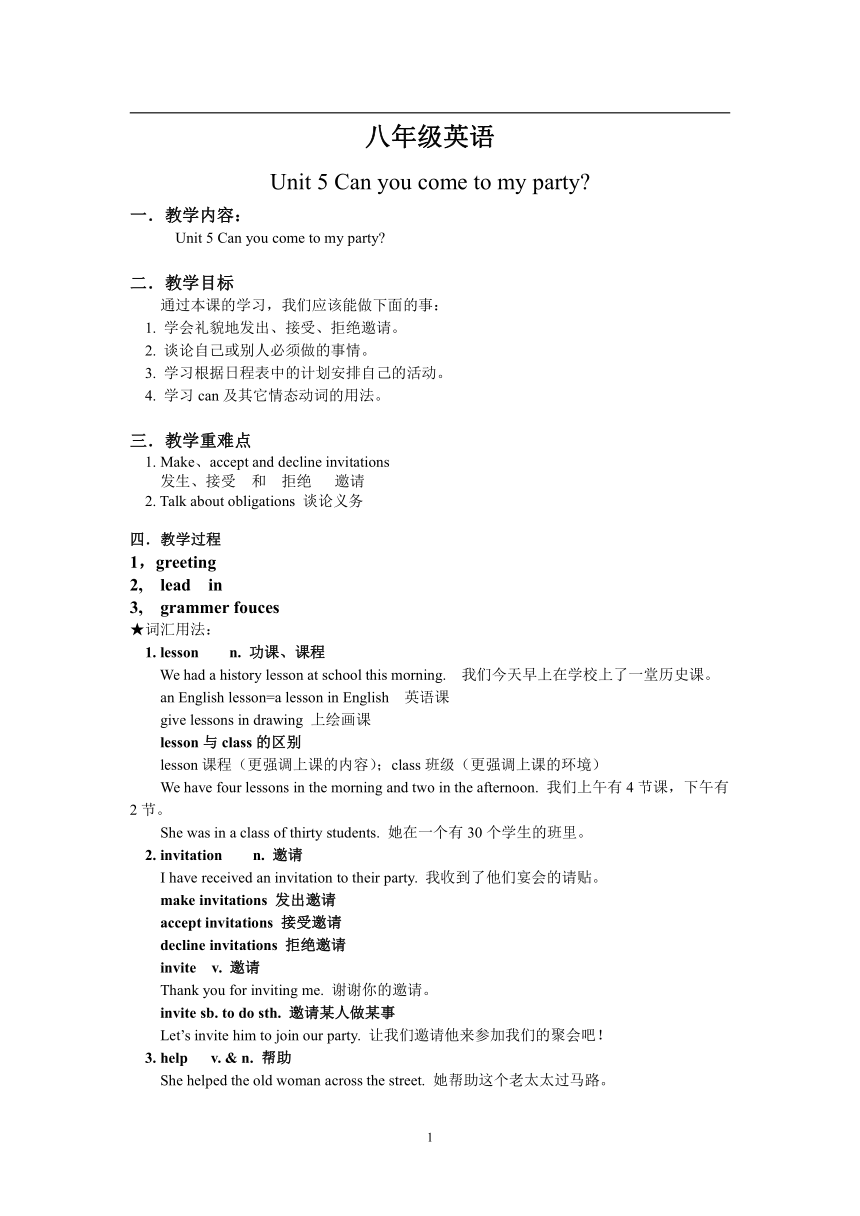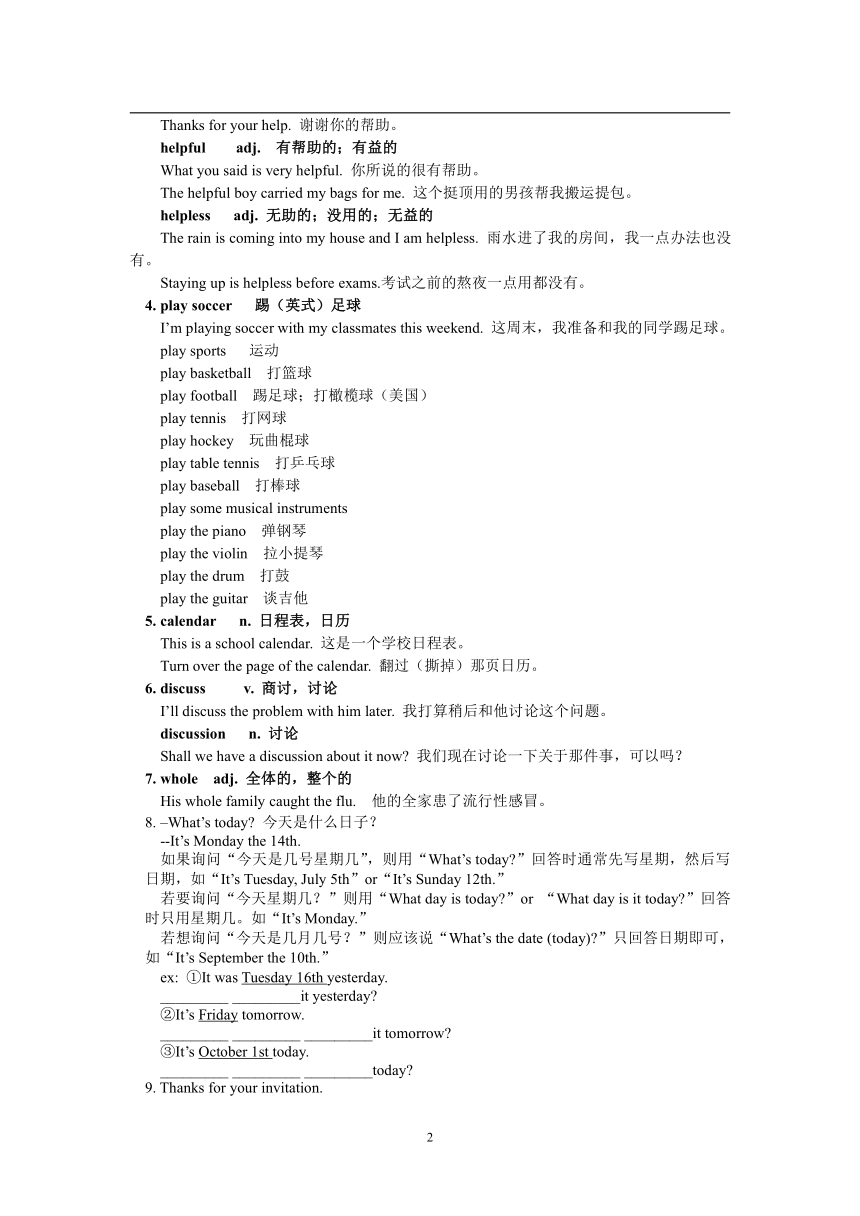八年级上英语|Unit 5 Can you come to my party?|知识点
文档属性
| 名称 | 八年级上英语|Unit 5 Can you come to my party?|知识点 |  | |
| 格式 | rar | ||
| 文件大小 | 13.6KB | ||
| 资源类型 | 教案 | ||
| 版本资源 | 人教新目标(Go for it)版 | ||
| 科目 | 英语 | ||
| 更新时间 | 2010-09-14 08:49:00 | ||
图片预览


文档简介
八年级英语
Unit 5 Can you come to my party
一.教学内容:
Unit 5 Can you come to my party
二.教学目标
通过本课的学习,我们应该能做下面的事:
1. 学会礼貌地发出、接受、拒绝邀请。
2. 谈论自己或别人必须做的事情。
3. 学习根据日程表中的计划安排自己的活动。
4. 学习can及其它情态动词的用法。
三.教学重难点
1. Make、accept and decline invitations
发生、接受 和 拒绝 邀请
2. Talk about obligations 谈论义务
四.教学过程
1,greeting
2, lead in
3, grammer fouces
★词汇用法:
1. lesson n. 功课、课程
We had a history lesson at school this morning. 我们今天早上在学校上了一堂历史课。
an English lesson=a lesson in English 英语课
give lessons in drawing 上绘画课
lesson与class的区别
lesson课程(更强调上课的内容);class班级(更强调上课的环境)
We have four lessons in the morning and two in the afternoon. 我们上午有4节课,下午有2节。
She was in a class of thirty students. 她在一个有30个学生的班里。
2. invitation n. 邀请
I have received an invitation to their party. 我收到了他们宴会的请贴。
make invitations 发出邀请
accept invitations 接受邀请
decline invitations 拒绝邀请
invite v. 邀请
Thank you for inviting me. 谢谢你的邀请。
invite sb. to do sth. 邀请某人做某事
Let’s invite him to join our party. 让我们邀请他来参加我们的聚会吧!
3. help v. & n. 帮助
She helped the old woman across the street. 她帮助这个老太太过马路。
Thanks for your help. 谢谢你的帮助。
helpful adj. 有帮助的;有益的
What you said is very helpful. 你所说的很有帮助。
The helpful boy carried my bags for me. 这个挺顶用的男孩帮我搬运提包。
helpless adj. 无助的;没用的;无益的
The rain is coming into my house and I am helpless. 雨水进了我的房间,我一点办法也没有。
Staying up is helpless before exams.考试之前的熬夜一点用都没有。
4. play soccer 踢(英式)足球
I’m playing soccer with my classmates this weekend. 这周末,我准备和我的同学踢足球。
play sports 运动
play basketball 打篮球
play football 踢足球;打橄榄球(美国)
play tennis 打网球
play hockey 玩曲棍球
play table tennis 打乒乓球
play baseball 打棒球
play some musical instruments
play the piano 弹钢琴
play the violin 拉小提琴
play the drum 打鼓
play the guitar 谈吉他
5. calendar n. 日程表,日历
This is a school calendar. 这是一个学校日程表。
Turn over the page of the calendar. 翻过(撕掉)那页日历。
6. discuss v. 商讨,讨论
I’ll discuss the problem with him later. 我打算稍后和他讨论这个问题。
discussion n. 讨论
Shall we have a discussion about it now 我们现在讨论一下关于那件事,可以吗?
7. whole adj. 全体的,整个的
His whole family caught the flu. 他的全家患了流行性感冒。
8. –What’s today 今天是什么日子?
--It’s Monday the 14th.
如果询问“今天是几号星期几”,则用“What’s today ”回答时通常先写星期,然后写日期,如“It’s Tuesday, July 5th”or“It’s Sunday 12th.”
若要询问“今天星期几?”则用“What day is today ”or “What day is it today ”回答时只用星期几。如“It’s Monday.”
若想询问“今天是几月几号?”则应该说“What’s the date (today) ”只回答日期即可,如“It’s September the 10th.”
ex: ①It was Tuesday 16th yesterday.
_________ _________it yesterday
②It’s Friday tomorrow.
_________ _________ _________it tomorrow
③It’s October 1st today.
_________ _________ _________today
9. Thanks for your invitation.
Thanks for…表示“因……而感谢某人”,介词for 表示原因,后接名词或动名词。这句话还可以说成Thanks for inviting /asking me.
e.g.: Thank you for your help.
=Thanks for helping me.
10. I’m really busy.
①busy 是形容词,意为“忙碌的”,反义词是free。
e.g.: I’m busy, so I have no time to visit you.(=not free)
②be busy with sth. 表示“忙于……”。
e.g.: He’s busy with his homework.
What are you busy with
③be busy doing sth. 表示“忙于做某事”。
e.g.:
We are busy studying for the test.
The boy is busy playing on the computer.
11. Please call me after the vacation.
call me意为“给我打电话。”表示“给某人打电话”时,有多种表达方法:
①ring/ call/ phone/ telephone +sb.
②ring sb. (代词)up 或ring up sb. (名词).
e.g.: ring me up; ring up the police;
③make a telephone call to sb.
④give sb. a ring/ call
12 I’m going fishing with grandpa the whole day.
①句中的whole是形容词,意思是“全部的,整个的,完整的。”强调整体性,其后通常接可数名词的单数形式。不能跟不可数名词。与定冠词the连用时,放在the后面,如the whole day/ week/ night. 当whole与复数名词连用时,强调“整个的”。e.g.: the whole three days.
②all指“一切的,所有的”,可以修饰不可数名词或可数名词的复数形式,all放在定冠词the、物主代词或名词所有格之前。如:
all the water, all the apples, all my money, all Jim’s books, all the three days
13. Can you come over to my house
此句中的come over意为“顺便来访”,其后通常跟地点名词或表示某一动作的不定式。e.g.:
①Would you like to come over to my office after work
②Can you come over to see me next week
14. I’m free till tomorrow.
①free是形容词,意为“空闲的,有空的”,be free=have time;还可表示“免费的”,“自由的”
②till是个连词,意为“直到……”。e.g.: I’ll be here till next Sunday.
★ 语法的重点难点
情态动词的用法
情态动词有一定的词义,但它们不能单独作谓语,必须和行为动词连用,用来表示说话人对某一动作或状态的态度和看法。情态动词后面多跟动词原形,它本身没有人称和数的变化。
1. can:能,能够。表示能力、允许、客观可能性,或用于否定句或疑问句中表示怀疑、猜测、惊讶等态度。
例:I can drive a car. 我会开车。
You can go now. 你现在可以走了。
2. could:can的过去式,表示能力、可能性、怀疑、猜测等态度。
例:She asked if she could take the books out of the reading room. 她问是否可以把书带出阅览室。
could还可以表示委婉地提出问题或陈述看法。
例:Could you tell me the way to the school 你能告诉我去学校的路吗?
3. may:可以。表示请求、许可、可能、或许、祝愿等。
例:May I use your pen 我可以用一下你的钢笔吗?
I may go to the park tomorrow. 我明天可能会去公园。
May all your dreams come true! 祝愿你的所有梦想成真。
may引导的一般疑问句,否定回答通常用mustn’t。
例:May I call him Mr. White No, you mustn’t. 我可以叫他怀特先生吗?不,你一定别。
4. might:may的过去式,表示过去可以做的事或可能发生的事。
例:He asked if he might look at my new shirt. 他问是否可以看看我的新衬衫。
He thought it might rain soon. 他认为很快会下雨。
5. need:需要。表示需要、必要,主要用于否定句和疑问句。
例:I needn’t clean the window. They aren’t dirty. 我没有必要擦窗户,它们不脏。
You needn’t worry about him. 你不必担心他。
6. must:必须。表示要做的事,可以用于肯定句中,表示肯定猜测。
例:You must finish your homework on time. 你必须按时完成作业。
You look so pale. You must be ill. 你脸色苍白,一定生病了。
mustn’t:表示不应该、不许可、不准等语气强烈。
例:You mustn’t speak loudly in the library. 你不许在图书馆大声喧哗。
We mustn’t waste our time. 我们不应该浪费时间。
must引导一般疑问句时,否定回答要用needn’t。
例:Must I practice listening now No, you needn’t. 我必须现在练习听力吗?不,不必。
7. dare:敢。表示敢于,用于疑问句、否定句及条件句中。
例:She dare not go out alone. 她不敢单独出去。
How dare you say that 你怎么敢那么说?
8. shall:将要。用于第一人称时,表示征求对方意见或请求;用于第二或第三人称时,表示意愿、允许、警告、命令等。
例:Shall we meet at the school gate 我们在学校门口集合,好吗?
You shall get the answer tomorrow. 你明天可以得到答复。
9. should:应该。表示义务,指出某种正确或合理的行为,常用来表示劝告。
例:You should obey the rules. 你应该遵守规则。
10. will:将要。表示意志、意愿,用于各种人称。
例:Will you help me with my work 你可以帮助我做工作吗?
He will ask you, if he has any questions. 如果他有什么问题,他会问你。
11. would:表示意志、意愿,或委婉地提出请求、建议或看法。
例:I said I would do anything for you. 我说过我愿意为你做任何事。
Would you like a cup of coffee 你想来杯咖啡吗?
五、课堂作业及分析
PAGE
1
Unit 5 Can you come to my party
一.教学内容:
Unit 5 Can you come to my party
二.教学目标
通过本课的学习,我们应该能做下面的事:
1. 学会礼貌地发出、接受、拒绝邀请。
2. 谈论自己或别人必须做的事情。
3. 学习根据日程表中的计划安排自己的活动。
4. 学习can及其它情态动词的用法。
三.教学重难点
1. Make、accept and decline invitations
发生、接受 和 拒绝 邀请
2. Talk about obligations 谈论义务
四.教学过程
1,greeting
2, lead in
3, grammer fouces
★词汇用法:
1. lesson n. 功课、课程
We had a history lesson at school this morning. 我们今天早上在学校上了一堂历史课。
an English lesson=a lesson in English 英语课
give lessons in drawing 上绘画课
lesson与class的区别
lesson课程(更强调上课的内容);class班级(更强调上课的环境)
We have four lessons in the morning and two in the afternoon. 我们上午有4节课,下午有2节。
She was in a class of thirty students. 她在一个有30个学生的班里。
2. invitation n. 邀请
I have received an invitation to their party. 我收到了他们宴会的请贴。
make invitations 发出邀请
accept invitations 接受邀请
decline invitations 拒绝邀请
invite v. 邀请
Thank you for inviting me. 谢谢你的邀请。
invite sb. to do sth. 邀请某人做某事
Let’s invite him to join our party. 让我们邀请他来参加我们的聚会吧!
3. help v. & n. 帮助
She helped the old woman across the street. 她帮助这个老太太过马路。
Thanks for your help. 谢谢你的帮助。
helpful adj. 有帮助的;有益的
What you said is very helpful. 你所说的很有帮助。
The helpful boy carried my bags for me. 这个挺顶用的男孩帮我搬运提包。
helpless adj. 无助的;没用的;无益的
The rain is coming into my house and I am helpless. 雨水进了我的房间,我一点办法也没有。
Staying up is helpless before exams.考试之前的熬夜一点用都没有。
4. play soccer 踢(英式)足球
I’m playing soccer with my classmates this weekend. 这周末,我准备和我的同学踢足球。
play sports 运动
play basketball 打篮球
play football 踢足球;打橄榄球(美国)
play tennis 打网球
play hockey 玩曲棍球
play table tennis 打乒乓球
play baseball 打棒球
play some musical instruments
play the piano 弹钢琴
play the violin 拉小提琴
play the drum 打鼓
play the guitar 谈吉他
5. calendar n. 日程表,日历
This is a school calendar. 这是一个学校日程表。
Turn over the page of the calendar. 翻过(撕掉)那页日历。
6. discuss v. 商讨,讨论
I’ll discuss the problem with him later. 我打算稍后和他讨论这个问题。
discussion n. 讨论
Shall we have a discussion about it now 我们现在讨论一下关于那件事,可以吗?
7. whole adj. 全体的,整个的
His whole family caught the flu. 他的全家患了流行性感冒。
8. –What’s today 今天是什么日子?
--It’s Monday the 14th.
如果询问“今天是几号星期几”,则用“What’s today ”回答时通常先写星期,然后写日期,如“It’s Tuesday, July 5th”or“It’s Sunday 12th.”
若要询问“今天星期几?”则用“What day is today ”or “What day is it today ”回答时只用星期几。如“It’s Monday.”
若想询问“今天是几月几号?”则应该说“What’s the date (today) ”只回答日期即可,如“It’s September the 10th.”
ex: ①It was Tuesday 16th yesterday.
_________ _________it yesterday
②It’s Friday tomorrow.
_________ _________ _________it tomorrow
③It’s October 1st today.
_________ _________ _________today
9. Thanks for your invitation.
Thanks for…表示“因……而感谢某人”,介词for 表示原因,后接名词或动名词。这句话还可以说成Thanks for inviting /asking me.
e.g.: Thank you for your help.
=Thanks for helping me.
10. I’m really busy.
①busy 是形容词,意为“忙碌的”,反义词是free。
e.g.: I’m busy, so I have no time to visit you.(=not free)
②be busy with sth. 表示“忙于……”。
e.g.: He’s busy with his homework.
What are you busy with
③be busy doing sth. 表示“忙于做某事”。
e.g.:
We are busy studying for the test.
The boy is busy playing on the computer.
11. Please call me after the vacation.
call me意为“给我打电话。”表示“给某人打电话”时,有多种表达方法:
①ring/ call/ phone/ telephone +sb.
②ring sb. (代词)up 或ring up sb. (名词).
e.g.: ring me up; ring up the police;
③make a telephone call to sb.
④give sb. a ring/ call
12 I’m going fishing with grandpa the whole day.
①句中的whole是形容词,意思是“全部的,整个的,完整的。”强调整体性,其后通常接可数名词的单数形式。不能跟不可数名词。与定冠词the连用时,放在the后面,如the whole day/ week/ night. 当whole与复数名词连用时,强调“整个的”。e.g.: the whole three days.
②all指“一切的,所有的”,可以修饰不可数名词或可数名词的复数形式,all放在定冠词the、物主代词或名词所有格之前。如:
all the water, all the apples, all my money, all Jim’s books, all the three days
13. Can you come over to my house
此句中的come over意为“顺便来访”,其后通常跟地点名词或表示某一动作的不定式。e.g.:
①Would you like to come over to my office after work
②Can you come over to see me next week
14. I’m free till tomorrow.
①free是形容词,意为“空闲的,有空的”,be free=have time;还可表示“免费的”,“自由的”
②till是个连词,意为“直到……”。e.g.: I’ll be here till next Sunday.
★ 语法的重点难点
情态动词的用法
情态动词有一定的词义,但它们不能单独作谓语,必须和行为动词连用,用来表示说话人对某一动作或状态的态度和看法。情态动词后面多跟动词原形,它本身没有人称和数的变化。
1. can:能,能够。表示能力、允许、客观可能性,或用于否定句或疑问句中表示怀疑、猜测、惊讶等态度。
例:I can drive a car. 我会开车。
You can go now. 你现在可以走了。
2. could:can的过去式,表示能力、可能性、怀疑、猜测等态度。
例:She asked if she could take the books out of the reading room. 她问是否可以把书带出阅览室。
could还可以表示委婉地提出问题或陈述看法。
例:Could you tell me the way to the school 你能告诉我去学校的路吗?
3. may:可以。表示请求、许可、可能、或许、祝愿等。
例:May I use your pen 我可以用一下你的钢笔吗?
I may go to the park tomorrow. 我明天可能会去公园。
May all your dreams come true! 祝愿你的所有梦想成真。
may引导的一般疑问句,否定回答通常用mustn’t。
例:May I call him Mr. White No, you mustn’t. 我可以叫他怀特先生吗?不,你一定别。
4. might:may的过去式,表示过去可以做的事或可能发生的事。
例:He asked if he might look at my new shirt. 他问是否可以看看我的新衬衫。
He thought it might rain soon. 他认为很快会下雨。
5. need:需要。表示需要、必要,主要用于否定句和疑问句。
例:I needn’t clean the window. They aren’t dirty. 我没有必要擦窗户,它们不脏。
You needn’t worry about him. 你不必担心他。
6. must:必须。表示要做的事,可以用于肯定句中,表示肯定猜测。
例:You must finish your homework on time. 你必须按时完成作业。
You look so pale. You must be ill. 你脸色苍白,一定生病了。
mustn’t:表示不应该、不许可、不准等语气强烈。
例:You mustn’t speak loudly in the library. 你不许在图书馆大声喧哗。
We mustn’t waste our time. 我们不应该浪费时间。
must引导一般疑问句时,否定回答要用needn’t。
例:Must I practice listening now No, you needn’t. 我必须现在练习听力吗?不,不必。
7. dare:敢。表示敢于,用于疑问句、否定句及条件句中。
例:She dare not go out alone. 她不敢单独出去。
How dare you say that 你怎么敢那么说?
8. shall:将要。用于第一人称时,表示征求对方意见或请求;用于第二或第三人称时,表示意愿、允许、警告、命令等。
例:Shall we meet at the school gate 我们在学校门口集合,好吗?
You shall get the answer tomorrow. 你明天可以得到答复。
9. should:应该。表示义务,指出某种正确或合理的行为,常用来表示劝告。
例:You should obey the rules. 你应该遵守规则。
10. will:将要。表示意志、意愿,用于各种人称。
例:Will you help me with my work 你可以帮助我做工作吗?
He will ask you, if he has any questions. 如果他有什么问题,他会问你。
11. would:表示意志、意愿,或委婉地提出请求、建议或看法。
例:I said I would do anything for you. 我说过我愿意为你做任何事。
Would you like a cup of coffee 你想来杯咖啡吗?
五、课堂作业及分析
PAGE
1
同课章节目录
- Unit 1 Where did you go on vacation?
- Section A
- Section B
- Unit 2 How often do you exercise?
- Section A
- Section B
- Unit 3 I'm more outgoing than my sister.
- Section A
- Section B
- Unit 4 What's the best movie theater?
- Section A
- Section B
- Unit 5 Do you want to watch a game show?
- Section A
- Section B
- Unit 6 I'm going to study computer science.
- Section A
- Section B
- Unit 7 Will people have robots?
- Section A
- Section B
- Unit 8 How do you make a banana milk shake?
- Section A
- Section B
- Unit 9 Can you come to my party?
- Section A
- Section B
- Unit 10 If you go to the party, you'll have a grea
- Section A
- Section B
